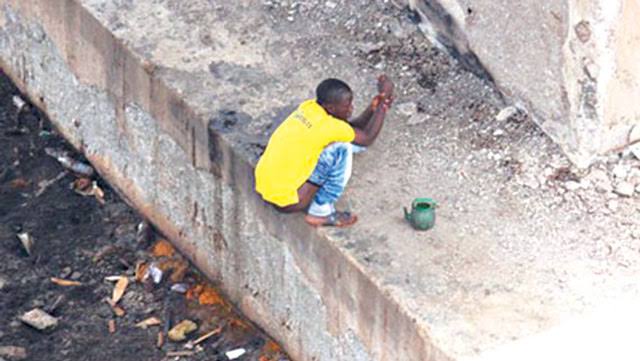Each morning, as the city of Lagos stirs awake and commuters make their way across its many bridges, an appalling sight unfolds—a sight that stains the reputation of this vibrant metropolis and threatens the health of its people. On the edges of the Lagos lagoon, men and women, often able-bodied and seemingly indifferent, defecate openly, turning the city’s waters into a dumping ground for human waste. This deplorable practice is more than just a source of disgust; it is a profound danger to public health, a desecration of the environment, and an affront to the collective dignity of Lagosians.
The root causes of this behaviour are as troubling as the act itself. At its core lies a failure of infrastructure. Large swathes of Lagos remain woefully underserved, with inadequate or entirely absent sanitation facilities. Many communities lack access to affordable or functioning public toilets, while in some cases, even private households are unable to afford the construction of basic latrines. Compounding these infrastructural gaps is the persistent shadow of poverty that forces people to prioritise immediate survival over sanitation. Adding to this is the explosive population growth of Lagos, which has overwhelmed its fragile systems and left its waterways and public spaces vulnerable to abuse.
But there is more at play here than just poverty and infrastructure. Cultural attitudes and habits, hardened over years of neglect, have normalised open defecation for some. This normalisation must be challenged, for its consequences ripple far beyond individual actions. The health implications are dire. Fecal matter seeps into water sources, spreading diseases such as cholera, typhoid, and diarrhea—ailments that disproportionately afflict the city’s most vulnerable populations, particularly children. The polluted lagoon becomes a toxic breeding ground, not just for disease but for economic despair, as fishermen and others who depend on its waters watch their livelihoods wither.
The environmental toll is equally devastating. The Lagos lagoon, once a vital artery of commerce and a cradle of biodiversity, is now being suffocated by pollutants. Human waste depletes oxygen levels in the water, endangering marine life and disrupting ecosystems that have sustained communities for generations. The degradation of the lagoon is an emblem of our failure to protect the city’s natural heritage and its future.
This descent into squalor must not be allowed to continue. The Lagos lagoon is not just a body of water; it is a symbol of the city’s identity and its aspirations. To allow its desecration is to admit defeat in the face of challenges that can—and must—be surmounted. The solution to this crisis lies in collective action and an unyielding commitment to change.
The government must take the lead, investing in sanitation infrastructure that reaches every corner of the city, no matter how remote or impoverished. Public toilets must be built, maintained, and made accessible to all, while households should be supported with subsidies to construct private facilities. These efforts must be accompanied by a sustained campaign to educate Lagosians on the dangers of open defecation, emphasising the profound health risks and environmental consequences.
However, education and infrastructure alone are not enough. There must be accountability. Stricter enforcement of environmental laws and public health regulations is necessary to deter offenders, while community leaders and traditional authorities must lend their voices to this cause, championing the importance of proper sanitation as a civic responsibility.
The restoration of the Lagos lagoon is not an abstract ideal; it is a moral and practical necessity. Cleanup efforts must begin immediately to rehabilitate this vital waterway and reverse the damage inflicted by years of neglect and abuse. This is not merely an environmental obligation but a profound act of respect for the countless lives that depend on the lagoon for sustenance and survival.
Lagos is a city of ingenuity and resilience, a city that thrives on its ability to overcome obstacles and reinvent itself. It must now apply this spirit to the urgent task of eradicating open defecation and safeguarding the lagoon that is so central to its life and identity. To do otherwise is to condemn future generations to inherit a legacy of disease, poverty, and environmental decay.
The sight of men and women defiling the lagoon is a painful reminder of how far we have fallen. But it is also a challenge—one that demands bold, decisive action. Lagos has the resources, the ingenuity, and the will to meet this challenge. The time to act is now. Let us save the Lagos lagoon and, in doing so, reclaim the dignity of our city and its people.
Copyright Ships & Ports Ltd. Permission to use quotations from this article is granted subject to appropriate credit given to www.shipsandports.com.ng as the source.
